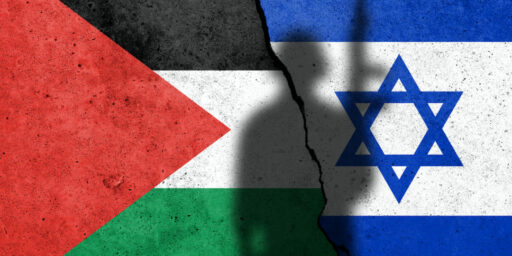Breaking the Insurgency
Julian Barnes has a long feature piece in U.S. News entitled, “Finding–and breaking–the ruthless killers of Iraq is not a pretty business. An exclusive inside look at how it’s done.” Barnes chronicles the attempts of Major Jonathan Fox, the operations officer of the 1st Battalion, 17th Infantry Regiment as he works with his Iraqi counterparts as they interogate a guerilla known as Abu Mahmoud. The story is spread over ten web pages but some choice excerpts will convey its essence.
It is an important debate about the way ahead in Iraq. How should America balance winning the war against the insurgency with maintaining its image and values? And how should American soldiers balance letting the indigenous police and Army do things their way while making sure they comply with western standards? These are questions the military has not faced since Vietnam. The arguments in the 1-17 battalion also show how the American mistreatment of detainees at the Abu Ghraib prison–and fear of another scandal–continue to loom over everything the military does, further complicating a mission rich in complication.
[…]
There is a problem, though. The American military’s regulations say that an Army unit can hold and question a detainee for only three days before he must go to a regional detention center, since battalion jails are not meant to be long-term holding facilities. After 2 1/2 years of occupation, many insurgents know the policy–and so keep their mouths shut while getting the “three hots and a cot” provided by the Americans.
[…]
For the past year, Iraqi Army units have received intense training in Mosul. American Special Forces units have drilled Iraqi Army companies on tactics. Military training teams have focused on teaching Iraqi staff officers mission planning. And the infantry battalions in Mosul conduct joint operations daily. The strong interest and focus have made the Iraqi Army units in Mosul quite effective. On raids the Iraqi soldiers often still swarm the buildings, rather than moving deliberately like an American infantry squad, but they know how to hunt insurgents.
The police have received far less training. Many of the American patrol leaders in western Mosul believe the police commanders in their neighborhoods are corrupt. And both the Americans and the Iraqi Army fear the police force could collapse again if challenged by insurgents. For their part, the police complain that the Iraqi Army soldiers shoot at them without cause. The all-Sunni police force in western Mosul also regards the Kurdish battalion in that part of the city as an occupying force. The reason is that when the Americans created the new Iraqi Army, they allowed Kurdish militia units, known as peshmerga, to join en masse. Though the Kurdish force is technically part of the Army, the Kurds, the Iraqi police–everyone, it seems, but Fox–still call its members peshmerga. Fox views repairing the police-Army relationship as one of his most important missions. “If you look at history,” Fox says, “no counterinsurgency effort has been successful in any war without the police and army working toward a common goal.”
[…]
The larger plan for Mosul is to get both the American and Iraqi military out of the city, leaving the police responsible for urban security. Therefore, the Americans need to help the police improve their counterinsurgency operations. Kelly doesn’t doubt that Majeed is a better interrogator than either the police or the Americans. But, he says, it was wrong to hand the prisoners over to him: “My biggest concern was the potential for detainee abuse. We are trying to teach them to get information the right way.” It may be impossible to teach the Iraqi interrogators not to use force, Kelly knows, but his battalion is going to try anyway. “You will never totally eliminate it–it is in this culture,” he says. “You have a country here that has lived by fear. But you have to hope that people can learn to trust the courts.”
[…]
Hassan orders Abu Mahmoud brought in. He is dressed in a brown dishdasha, the traditional Arab body shirt that the American soldiers call a man-dress. His closely cut hair is receding, and he has a two-day growth of beard. He looks like Hollywood’s version of a terrorist. Abu Mahmoud gives Fox, Majeed, and Hassan a hard look. Abu Mahmoud, whose real name is Hassan Mahmoud Yunes, has admitted killing the campaign worker, and the police press his thumb to a written statement of the crime. Why, Hassan asks, has Abu Mahmoud attacked the party members and laid the roadside bombs? “The reason I did this is that five from my family got killed by the Americans,” Abu Mahmoud says. “That is why I took on this role.”
[…]
His battalion has been working hard over the past four months, Fox says, to discourage the Iraqis from hitting or beating detainees. “A big thing is to try and teach them to treat people with dignity and respect,” he says. There are, unfortunately, consequences to changing the Iraqi way of doing business. “When we first got here, it was very common,” he says of the beatings. “Now it is less and less. But the information is also less and less.” Does that mean beating detainees works? “The Iraqi Army,” Fox says, “will tell you absolutely it leads to actionable intel.”
[…]
Originally a pilot, Majeed became an interrogator in Saddam’s army in 1996 after the U.S.-imposed no-fly zone shut down the Iraqi Air Force. He rose to the rank of lieutenant colonel and was due to be promoted to full colonel in May 2003. But the Americans invaded. The old Iraqi Army was defeated, then dismantled. When the military was re-created, Majeed was offered the rank of major. It was the only job available.
Majeed says he does not torture people, adding that there is more to his interrogation methods than simply hitting someone. “I am like a professor of psychology,” he says. “I can tell when they want to talk.” Nashwan had not slept, bathed, or eaten for three days when he arrived at the battalion headquarters. Majeed gave him a shower and some food. “We gave him all that stuff,” Majeed recalls, “then we told him, ‘We gave you what you asked for. If you want more, you are going to have to help us.’ ”
[…]
Majeed says he would never break a bone or inflict intense pain. “I don’t use physical torture. Last year, I was slapping guys, and we hit them,” he says. “Right now, we are using different techniques.” Is Majeed telling the truth? He is a sophisticated man, and he knows Americans disapprove of torture. He is savvy enough not to admit using torture, even if he does. When asked about whether the Abu Ghraib scandal tied the hands of the Americans, his answer is telling: “There is no way if I was going to torture someone or be tough I would take pictures. If I wanted to do something like that, I would close the door and do my thing.”
Majeed says he understands why Americans have their rules. But he says they often frustrate him, especially when a detainee is taken away just as he is starting to talk. Majeed says he was disappointed that he had Abu Mahmoud less than 12 hours. If he had been allowed to keep him longer, he says, he could have gotten more information. “Maybe he would have told me where he got the IED s from. Maybe he would have said the names of other cell leaders,” Majeed says. “I could have gotten more information. Maybe he would have told me.”
Majeed has a good relationship with the 1-17 battalion, he says, and particularly with Fox. “I can tell we think alike,” Majeed says. “Major Fox is trying to understand how the locals think.” But after working with Americans for the past 2 1/2 years, Majeed is beginning to understand how they operate–and to see what he regards as weaknesses when it comes to fighting insurgents. “The Americans have a line. They like to follow a straight line. They don’t like to zigzag,” Majeed says. “But sometimes there needs to be a special case. Sometimes,” he says, “we need to go over the line.”
After three years, the cultural divide is still huge. Partly, I suspect, this is a function of American troops rotating out and replaced by fresh ones for whom Arabs wearing a “man dress” is unusual. Mostly, though, it’s the inherent difficulty of imposing a set of mores developed over time by a society that takes security and prosperity for granted on a society desperately trying to achieve those conditions.
via Andrew Sullivan





